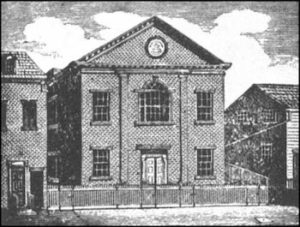
ADA client, African Free School
*On this date, 1828, the African Dorcas Association was founded. This was a Black women's community aid society in New York City.
The women of this group sewed clothes for the city's Black children so that they would have appropriate attire for school. They were also one of the first societies where "women met independently and without the supervision of men." Through this work, the members of the African Dorcas Association made education more accessible for Black youth in New York City.
In their first year, they distributed 168 articles of clothing to school children. They became a prominent contributor to encouraging young Black children to attend school. Once slavery had been abolished in New York, the Black population grew. As a result, the city leaders, both Black and white, realized the increasing demand to educate these children. The women in the African Dorcas Association held weekly Wednesday meetings and elected officer positions to lead this organization. These meetings were held at the home of their president, Margaret Francis. Henrietta Green Regulus Ray acted as the African Dorcas Association's secretary.
The clothing they made was given to the member's children's schoolmates, neighbors, and friends. The Association also unveiled the difference in the "gender dynamic within New York's Black activist community" because it was geared towards youths; it demonstrated a motherly and nurturing form of activism, which should not be confused with sexism. The overall activities of the society reflected the "African Ethic," in which people collectively contributed various skills for a single cause to help Black youth get an education.
It was predetermined that a big reason Black youth were not attending school was that they did not have adequate or even appropriate attire, including clothes and shoes. Their clothing was old and worn, especially in the winter, and with some children having to walk several blocks to get to school, it was no wonder they were missing school. The African Dorcas Association recognized this tragedy and initiated a change.
They succeeded in doing so, and it was not an organization solely based on money and external funds; they used their resources and found more ingenious ways to get things done. Work in the African Dorcas Association was connected to religious beliefs and practices, such as serving others. The sole purpose of the African Dorcas Association was to "provide clothing and other necessary items for poor students who could not afford to do so." The acts of the African Dorcas Association were also representative of their "cultural practices, in which men and women performed different activities, yet everyone's contributions were seen as essential." The women of this Association achieved their mission by presenting these children with clothing that allowed them to attend school and get an education.
Women put together the Association at its establishment; however, society did not find that acceptable. As a result, Samuel Cornish, abolitionist and minister, participated on the Association's initial board. After the group established its rapport in the community, women participants took more leadership roles in the association. Some New Yorkers surrounding the organization did not find it appropriate for Black women to be educated or involved in societal issues in this way, yet, despite the opposition, the African Dorcas Association thrived. However, this organization came under scrutiny by the public in September 1828; however, despite these setbacks, by February 1829, the women of this organization had "managed to distribute and clothe 64 boys and girls." Operating from New York City’s African Free School, the society continued into the 1830s.